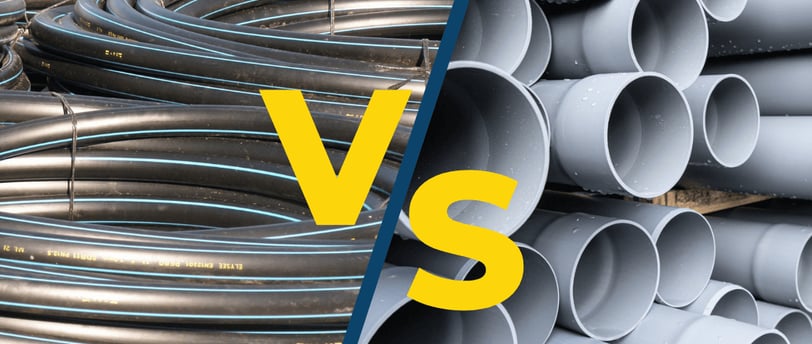PVC vs Poly Pipe: Which Should You Choose for Your Irrigation System in the UK?
PVC vs Polyethylene (flexipipe). Which is better, and why?


PVC vs Poly Pipe: Which Should You Choose for Your Irrigation System in the UK?
When setting up an irrigation system, one of the first decisions you’ll need to make is which type of pipe to use. In the UK, particularly in areas like London and Hertfordshire, poly pipe is often the preferred choice. But PVC (polyvinyl chloride) also has its place in certain situations. The right choice depends on your location, soil type, and specific needs. Let’s explore the pros and cons of each, with a focus on what works best when London Irrigation Specialists design and install irrigation systems.
PVC: The Sturdy, Reliable Option
PVC is a strong, rigid pipe that’s commonly used in high-pressure irrigation systems. In some areas, such as those with sandy soil, PVC is often preferred because it stands up well in these conditions. However, in the UK, particularly in London and Hertfordshire, where the soil tends to be clay-heavy, PVC’s rigidity can become a disadvantage. Clay soil often shifts and contracts with changes in moisture and temperature, which can lead to cracks in PVC pipes over time. This is especially true during the winter months when freeze-thaw cycles can cause further stress on rigid pipes. You can read about winterisation and our maintenance packages that we offer.
While PVC might be ideal for certain irrigation designs, its requirement for frequent fittings—every 3m or so—can make the process of installing irrigation more complex, although you can buy longer stretches, but they won't usually get over 5m. This increases the potential for leaks, making irrigation maintenance and irrigation repair more frequent tasks, especially in challenging soil conditions.
Poly Pipe: The Flexible, Easy-to-Install Contender
In the UK, and especially in areas like London and Hertfordshire, poly pipe is the preferred material for irrigation systems. When London Irrigation Specialists install irrigation systems, we typically use poly pipes because of their flexibility and ease of installation. Poly pipe bends and adapts to the contours of the land, reducing the need for numerous fittings and making installation quicker and more straightforward. This flexibility also means it’s better equipped to handle the natural shifting of clay soils, reducing the risk of cracks and leaks.
One of the key advantages of poly pipe is how it simplifies the process of maintaining irrigation systems. Poly pipes are easier to cut and work with, which not only makes the installation process smoother but also makes irrigation repair tasks simpler and less time-consuming. Whether you’re dealing with a small garden in Hertfordshire or a larger landscape in London, poly pipe ensures that both installation and ongoing maintenance are efficient and cost-effective.
Moreover, poly pipe is available in several grades, such as LDPE, MDPE, and HDPE, with HDPE (high-density polyethylene) offering comparable strength to PVC. HDPE can handle pressures up to 100 bar, making it a robust option for most residential and commercial irrigation systems.
Given the UK’s temperate climate, poly pipe’s resilience to temperature fluctuations is another significant advantage. It’s less likely to become brittle in the cold, which can be a common issue with PVC pipes during the winter months. This makes poly an excellent choice for anyone looking to design an irrigation system that will withstand the varied weather conditions typical of the UK.
The preference can depend where you are in the world, from country to country and city to city. On an agricultural level, poly pipe can often be the preference - see this other blog post from Apollopipes.
Why Poly is the Go-To in the UK
The preference for poly pipe in the UK isn’t just about flexibility and ease of installation—it’s also about suitability for our climate and soil conditions. London’s clay soils are notorious for their movement, which can cause issues with rigid piping systems like PVC. Poly’s ability to flex and move with the soil helps prevent breakages and ensures the longevity of your irrigation system.
In addition, the UK’s temperate climate, with its relatively mild winters, reduces the risk of freezing pipes, but the occasional cold snap can still cause issues. Poly pipe’s flexibility makes it more resilient to these temperature fluctuations, reducing the likelihood of damage during the winter months.In the UK, especially in regions like London and Hertfordshire, poly pipe is the clear winner for most irrigation projects. The dense, clay-heavy soils common in these areas are well-matched with poly’s flexibility and durability. It’s easier to install, requires fewer fittings, and is generally more cost-effective than PVC.
Furthermore, poly pipe’s availability in the UK means you’ll have no trouble sourcing the right materials for your project. Local suppliers across London and Hertfordshire are well-versed in the benefits of poly pipe and can provide expert advice and support for your irrigation design and installation needs.
Why Poly is the Go-To in the UK
When it comes to installing an irrigation system in the UK, particularly in clay-heavy areas like London and Hertfordshire, poly pipe is the best choice. Its flexibility, ease of installation, and resilience to local soil and climate conditions make it the preferred option for both homeowners and professionals. While PVC has its strengths, especially in sandy soils or high-pressure situations, poly offers the versatility and reliability that’s ideal for the unique challenges of UK landscapes.
Whether you’re looking to install irrigation, design an irrigation system, or maintain an existing one, choosing poly pipe will ensure a durable, efficient, and cost-effective solution tailored to the specific demands of UK soil and climate.
Get in touch...
If you want to know about how we operate, or want us to install your irrigation system, get in touch!
Phone
+44 7356 050025
+44 7478 525200
info@londonirrigationspecialists.co.uk


